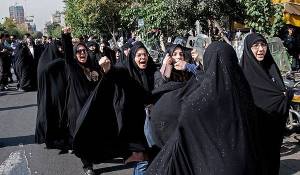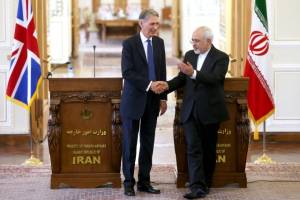Hoping to expand ties with Iran in the wake of the nuclear deal, the UK reopened its embassy in Tehran. However, they were met with local violent resistance.
The British were quick to warm their diplomatic relations with the Islamic Republic following the signing of the nuclear agreement with the P5+1 Powers.
UK Foreign Secretary Phillip Hammond flew to Tehran on Sunday to participate in the reopening of the British embassy in the Iranian capital, which was shut down four years ago, following violent protests by the Iranians.
“Maintaining dialogue even under the most difficult conditions is crucially important,” Hammond said during a joint press conference with Iranian Foreign Minister Mohammad Javad Zarif. “So reopening the embassy in Tehran and the Iranian embassy in London is not just an important symbol. It’s an important practical channel for being able to engage on the very many issues that are of concern and the very many issues that we have shared interests.”
Zarif welcomed the reopening of the British Embassy, saying it showed Iran’s regional and global significance.

Iranian women protest the reopening of the British embassy in Tehran. (Fars news)
“This will be a new start in the relations of Iran and Britain which has seen several ups and downs over the past years. Today we have entered a new stage of ties based on mutual respect, policy of constructive interaction and dialogue,” he said.
The British attempted to color the event in glowing and positive colors, talking about a new and bright future shared by the British and the Iranians.
However, the Iranians were a lot less supportive of the event, and welcomed the new British mission with violent protests and expressions of anger.
Several protesters were arrested in front of the British embassy in Tehran, Iran’s Fars news agency reported.
The streets near the embassy compound were heavily guarded since early Sunday morning by the special police and law enforcement troops who dispersed the people to avoid any protest gathering.
Iranian hard-liners oppose the improved relations with London. Many of them had called the British Embassy the “epicenter of sedition” when they attacked it in November 2011. They accused the country and its media, including the BBC, of fomenting unrest and encouraging rioters in Iran after the disputed 2009 presidential elections.
Many Iranian university student formations, political figures, officials and elites had slammed the reopening of the British Embassy, and called for a gathering in front of the mission to protest at what they called as the “Black Sunday.”
“The foreign ministry should have made a statement before the reopening of the British embassy and should have told people the cause of the reopening,” Secretary of the University of Tehran Students’ Islamic Society Reza Nazari told FNA on Sunday.
“Has Britain promised to avoid meddling in Iran’s internal affairs? The old cunning fox should promise not to incite sedition in Iran again,” he added.
“History has shown that Britain has always wanted to spy on Iran and incite sedition and today, we have the same assessment and prediction and Britain is unlikely to be in pursuit of any other goal other than spying and mischief,” senior Iranian legislator Seyed Amir Hossein Qazizadeh Hashemi told FNA.
Meantime, Secretary of the University Students Justice-Seeking Movement said that Britain’s attitude towards Iran has worsened after the closure of its embassy in Iran. “Reopening the British embassy in Iran would be a counterrevolutionary, illegal and irrational move,” Hossein Shahbazi said.
The Fars news agency, which is considered close to Iran’s conservative camp, best captured the sentiment with the headline: “Den of fox reopened.”
In Attempt to Repair Damaged Relations
Relations between Iran and Britain hit an all-time low in November 2011, when the two countries shut down their diplomatic missions around Britain’s key role in the imposition of a new set of western sanctions against Iran and its “repeated meddling with Iran’s domestic affairs”, as the Iranians perceive it.

Iranian Foreign Minister Zarif (R) and British Foreign Secretary Hammond shake hands for media at the conclusion of their press conference in Tehran. (AP/Ebrahim Noroozi)
Iran recalled all its staff and closed its embassy in London in November after Britain recalled its diplomatic mission in Tehran due to massive protests in front of the British embassy complex by thousands of Iranian students who demanded a cut of ties with London.
A famous photo from the time, is a picture of Queen Elizabeth II hanging in the embassy with the words “death to Britain” scrawled on it.
The Iranian students’ November 2011 protests at the British mission came after the Iranian legislators, in an open session of parliament, approved the bill of a law on downgrading relations with Britain. After the parliament approval, Iran expelled the British ambassador from Tehran.
The parliament approval came a week after the US and Britain targeted Iranian financial sectors with new punitive measures, including sanctions on Iran’s Central Bank and petrochemical industry.
After President Rouhani rose to power, he and his foreign minister Zarif pursued the policy of detente and started talks with London on the resumption of diplomatic ties and reopening embassies.
By: Max Gelber, United with Israel
AP contributed to this report.

Sign the Petition to Stop a Nuclear Iran
The US Congress must ensure that sanctions against Iran remain in force until the nuclear threat is completely eliminated.
I strongly oppose easing sanctions before the nuclear threat from Iran has been eliminated. Allowing Iran to enrich uranium without being subject to 'anytime, anywhere' inspections is extremely dangerous and unacceptable. Iran's nuclear program must be stopped.
See our Privacy PolicyClick Here to Share the Petition with Your Friends
Click here to locate and contact your Senator.
Click here to locate and contact your Congressman.
Send Passover Packages to Needy Israeli Soldiers - Bring Them Joy!
We are honored to thank the young men and women of the IDF who risk their lives every day to protect the citizens of Israel. Since October 7th, soldiers have been on the battlefield for months - many are hoping to come home for Passover.
Join us in sending Passover food packages (and personal notes) to Israeli soldiers and their families.
Many soldiers spend the Passover holiday with needy families back home. The soldiers greatly appreciate your love and concern. Bring them Passover joy!
CLICK HERE TO SEND YOUR PACKAGE AND NOTE TO ISRAELI SOLDIERS!



